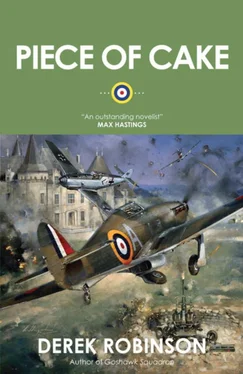The billiard room was empty. “You go first,” Kellaway said. Barton took a cue, aimed carefully and mis-hit the ball completely. “Bad luck,” Kellaway said. “Have another go.” This time Barton’s hands were shaking so much that his cue-tip kept knocking against the ball. “Tell you what,” Kellaway said. “We’ll have a sandwich and a beer.” He was about to ring for a waiter when Barton stopped him. “No need,” he said. “This is the stuff.” He shook a tablet from a little bottle.
“Benzedrine,” Kellaway said. “Good, is it?”
“Dunno why I didn’t think of it before.” Barton swallowed the tablet.
“Too groggy, I expect. That’s the trouble with being groggy. You can’t work things out properly, can you?”
“I’ll be all right now. You watch.”
Within minutes his eyes were brighter, his complexion was fresher, his actions were brisker and he was talking freely.
“How long have you been taking those?” Kellaway asked.
“About a week.” He smacked a red so hard that it traveled around the table twice.
“Don’t they keep you awake?”
“So what? I can’t sleep much anyway. Your shot, uncle.”
He was going strong, slamming balls crisply and even potting some, when Jacky Bellamy walked in with CH3 and Skull. “Hello!” he said. “What are you doing here?”
“I’m still attached to the Air Ministry wreck-hunters,” she said. “We’ve been checking out this area.”
“Jolly good show.” He whacked a red and watched with pleasure as it caromed around the table. “Nice to know we’re keeping you busy.”
She waited until the ball had come to rest. “Not as busy as you might think.”
Barton swung his cue like a pendulum and looked at each of them in turn. “Never saw such a gloomy lot of sods in all my life,” he said. “Go on, then, tell me the trouble. It can’t be any worse than what’s happened already.”
“I’ll give you the bare facts,” she said. “By my reckoning Fighter Command has been overstating German losses by a minimum of fifty percent and a maximum of two hundred percent over the last few weeks. It averages out at one hundred percent.”
“Gibberish,” said Kellaway.
“I don’t think so.”
She was perched on the edge of the table, and in its brilliant light her features had an unusual strength and clarity. Skull, watching from the side, was briefly amused by the scene: Venus lecturing Mars, he thought, but he quickly challenged his own assumptions. Why should men hold a monopoly of the truth about war? He was ashamed of his arrogance.
“Let’s look at one short period,” she said, and flipped open her notebook. “August eleventh to August twenty-fourth. Say, two weeks. Total claims: 743 enemy aircraft, of which 107 were said to have been destroyed by flak. That would leave 636 German raiders claimed by RAF fighters. Anybody care to guess how many of those were found? How many of the 743 turned up as wrecks on British soil?”
Nobody cared to guess.
“One hundred and thirteen,” she said.
“A lot fell in the sea,” Barton said. He was standing opposite her, rolling a snooker ball from hand to hand.
“More than a lot, it seems. According to HQ Fighter Command, nearly all the rest fell in the sea. When they were shown these figures and asked to comment on the discrepancy, the people at Fighter Command went off and studied them and came back and said their reports showed that eighty percent of all enemy aircraft destroyed fell in the sea.”
“That must be an exaggeration,” Skull said.
“Why?” Barton asked. “What do you reckon it should be?”
“Well, assuming this squadron to be typical, I’d say about half-and-half is nearer the mark.”
“Most of the intelligence officers I’ve talked to agree,” Jacky Bellamy said.
Barton wrinkled his nose. “More like sixty-forty, I’d say.”
“Okay,” she said. “As it happens I decided to play safe and make it sixty-forty. Sixty percent over sea, forty percent over land. Here’s how those mid-August figures break down. There were 743 claims in all. If forty percent came down inland, that means 297 German planes crashed where they could be found. As I said, we found 113 wrecks, which is a difference of 184. On that basis, Fighter Command overstated its claims by something like a hundred and sixty percent.”
“Well, that’s got to be nonsense.” Barton shaded his eyes and looked for CH3. “Where’s the great organizer?” He found him sprawled across a chair in a shadowy corner. “You’re not saying much, CH3. Get your mighty brain in gear.”
“Those figures only cover two weeks,” CH3 said. “That’s not much of a sample. We’ve been stooging about upstairs for much longer than that.”
Barton turned and smirked at Jacky Bellamy.
“I was going to spare you the worst,” she said, “but if you insist…” She turned a page. “The full investigation was backdated to August eighth. No special reason, they just picked a date and that was it. Add up all the claims since August eighth—I mean the official figures, the stuff you hear on the BBC every night—and you get a total of just under fifteen hundred German planes destroyed, plus about five hundred probably destroyed. Suppose only half the probables actually went down. That means the RAF claims it destroyed one thousand seven hundred and fifty German planes in the last month.”
“Bloody good show,” the adjutant said.
“One sometimes wonders where they keep coming from,” Skull murmured.
“Shut up, Skull,” Barton ordered. “There you are, then,” he told her. “That puts the record straight, doesn’t it?”
“There’s more to come. Monthly totals: RAF claims—seventeen-fifty; German wrecks actually found—three hundred.”
“You didn’t look hard enough,” the adjutant said.
“In all fairness,” Skull remarked, “the men from Air Ministry have been doing the looking. Miss Bellamy is simply an observer.”
“Planes crash in woods, you know,” Barton said. “And lakes, and reservoirs and things.” He balanced the cue on his fingertip.
Skull said: “One takes your point, Fanny, but that factor can’t account for such a huge discrepancy, can it? I mean, here we have an air battle over one of the most populous corners of this crowded little island, in daylight. It’s very hard to believe that so many aircraft could crash without being noticed.”
“Observer Corps posts,” CH3 remarked from the corner. “Police. Ack-ack units. Home Guard. Army.”
“In any case,” Skull added, “our own intelligence experts are very keen to examine German planes.”
“Well, we couldn’t find more than three hundred,” she said. “Three hundred from seventeen-fifty leaves fourteen-fifty. Assume about half of them in the sea, that leaves an overstatement of about seven hundred. The conclusion I come to is that your official RAF claims are out by upward of a hundred percent.”
“I suppose you’ll be saying next that we lie about our own losses too,” Kellaway said.
“I don’t know anything about that.”
“No, but you’ve heard the German claims.”
“Yes, and I doubt if Luftwaffe pilots are any more reliable than RAF pilots.”
“If you were a man,” Kellaway said, “I’d knock you down for that.”
“Then you’re an ass,” Skull informed him.
“Say that again.”
“Shut up, uncle,” Barton said. The benzedrine was beginning to wear off. “Those are all just figures,” he said to her. “Numbers. Anyone can prove anything by statistics.”
“Sure. But there’s another side to the profit-and-loss picture, and that’s your bombers. Every night you’ve been raiding Hitler’s invasion fleets, all those barges in Boulogne and so on. Bad flak over there. Plenty bombers don’t come back.”
Читать дальше












